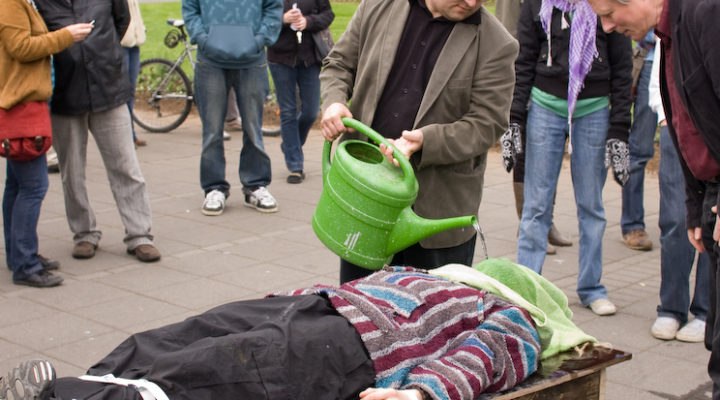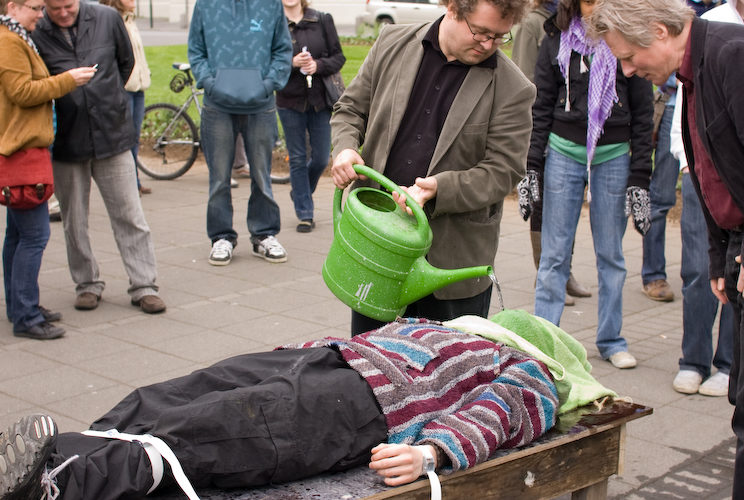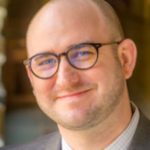A former military officer turned Baptist minister denounced torture as “unjust, immoral and unethical on religious grounds” in a telephone press conference March 15 launching the new nonprofit North Carolina Commission of Inquiry on Torture.
“All religions traditions affirm the sanctity of every human life,” said Ben Boswell, senior minister at Myers Park Baptist Church in Charlotte, N.C. “When we allow torture to take place, we are denying that sanctity.”
The commission, created to address North Carolina’s role in the nation’s secret detention and torture program launched after the Sept. 11 attacks, will investigate and report on the state’s role in the CIA’s Rendition, Detention and Interrogation program.
Declassified documents and news reports indicate that after 9/11 the CIA secretly used North Carolina as a staging ground to launch flights which picked up suspected terrorists abroad and transported them to CIA “black site” prisons in Eastern Europe and Asia. There, U.S. personnel could operate beyond the reach of U.S. law and use “enhanced interrogation techniques,” or torture, to gather information and intelligence.
It is the first non-governmental inquiry of its kind, and organizers hope it will encourage similar efforts to promote transparency and accountability beyond the state’s borders.
“I hope this local effort has national implications,” said retired U.S. Army Colonel Lawrence Wilkerson.
Wilkerson, former chief of staff to Secretary of State Colin Powell, said “torture does not work” as a military strategy.
“It produces confessions,” he said, and is used by dictators for that purpose, but “if what you want is actionable intelligence … forget it.”
Wilkerson said torture destroys the nation’s reputation around the world and rebounds on American armed forces in the form of “reciprocity” — referenced in the Golden Rule — once you do something to the other, the other feels justified in doing it to you.
While the North Vietnamese and North Koreans treated prisoners of war harshly, Wilkerson said he agrees with Sen. John McCain: “It’s not about them, it’s about us.”
“America needs, always, to occupy the high ground, not the low ground,” Wilkerson said. “We need to be the prosecutors at the next Nuremburg, not the defendants.”
Boswell, who was educated at Marion Military Institute in Marion, Ala., and served as a First Lieutenant in the North Carolina Army National Guard, said the religious community has been and will continue to be outspoken against the use of torture.
Baptist ethics professor David Gushee, director of the Center for Theology and Public Life at Mercer University, says for Christians, torture is always wrong.
“Torture violates the dignity of the human being,” Gushee wrote in a 2006 article published by Christianity Today. It “mistreats the vulnerable and violates the demands of justice.”
Gushee said authorizing torture “trusts government too much.” It “dehumanizes the torturer,” he said, and “erodes the character of the nation that tortures.”
Forty years ago Gushee’s was a mainstream Baptist view. A resolution passed by the Southern Baptist Convention in 1977 said torture “is a sign of spiritual death and leads to increased moral blindness, producing fear, hatred, violence and war, and dehumanizes both the torturer and the person tortured.”
The resolution condemned “any use of torture as a sin against God and a crime against humanity” and affirmed that “torture demonstrates the very opposite of love and violates the will of God revealed in Jesus Christ.”
Current SBC leaders, post-9/11, are less sure.
“I would argue that we cannot condone torture by codifying a list of exceptional situations in which techniques of torture might be legitimately used,” Albert Mohler, president of Southern Baptist Theological Seminary, wrote in 2005. “At the same time, I would also argue that we cannot deny that there could exist circumstances in which such uses of torture might be made necessary.”
The progressive Alliance of Baptists, meanwhile, affirms that torture is a moral issue. In 2012 the Alliance endorsed A Statement of Conscience of the National Religious Campaign Against Torture.
“Torture violates the basic dignity of the human person that all religions, in their highest ideals, hold dear,” said the statement first introduced in 2006. “It degrades everyone involved — policymakers, perpetrators and victims. It contradicts our nation’s most cherished ideals. Any policies that permit torture and inhumane treatment are shocking and morally intolerable.”
Boswell, who earned his M.Div. at Duke Divinity School, has completed course work for the Ph.D. at Catholic University of America and taught political theology and ethics at the John Leland Center for Theological Studies. He encouraged faith communities to confess involvement and complicity by shedding light on acts of state supported torture, exposing torture as unjust, naming victims in public services, serving in solidarity with victims of torture, advocating for laws and financially supporting agencies working to end torture.



